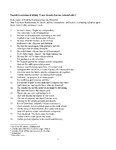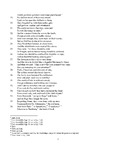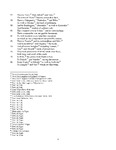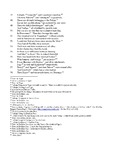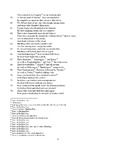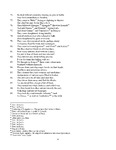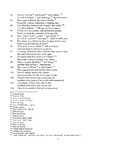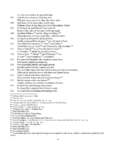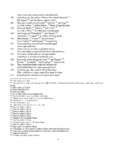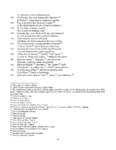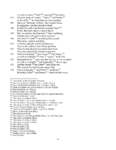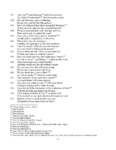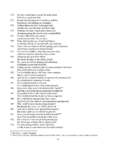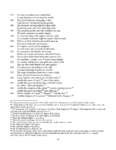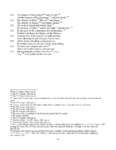Discourses of Muslim Scholars in Colonial Ghana
by John Hanson and Muhammad al-Munir Gibrill
Colonial Rule 2 (historical poem)
Creator: al-ḥājj 'Umar ibn Abī Bakri of Kete-Krachi
Description: This historical poem is one of three composed by al-ḥājj 'Umar ibn Abī Bakr of Kete-Krachi (commonly al-ḥājj 'Umar Krachi)) to describe and comment on European colonial rule in West Africa.
Al-ḥājj 'Umar Krachi was positioned well to provide commentary from a West African Muslim perspective on the European colonial advance into the region during the late nineteenth century. He was born in the Sokoto Caliphate established by Muslims rallying behind 'Uthmān dan Fodio’s call for Muslim reform in the early nineteenth century; at the time of the European conquest, he was residing in the Hausa diaspora in two Muslim commercial towns (Salaga and later Kete-Krachi, both in today’s Ghana) that were connected to Muslim scholarly and commercial networks throughout the savanna and rainforest. Al-ḥājj 'Umar Krachi heard reports from traveling Muslim scholars and merchants of the military advance of various European powers, and his commentaries, in three poems written over the course of a decade, provide his evolving view of European colonialism in West Africa.
The second poem describes the colonial conquest, as did the first poem, but it was written one year later and is a longer and more complex poem. It also is the most widely-cited poem on the European conquest by al-ḥājj 'Umar Krachi.
Al-ḥājj 'Umar Krachi's descriptions of the European conquest in this poem are more detailed and the commentary is bolder than the first colonial poem. Al-ḥājj 'Umar details the dismal performances of African soldiers facing the technological superiority of European colonial armies. The poem uses subtle and effective constructions to render these military encounters, narrating the conquest of over two hundred towns, territories, and ethnic groups. Al-ḥājj 'Umar did not conceal his outrage at the violence perpetrated by Europeans powers upon African peoples, and he represents the campaigns as unprovoked acts of inhumanity and savagery. Notable, too, is the poet’s sense that colonial rule upended social hierarchies between nobles, commoners and slaves, resulting in the destruction of African societies. Al-ḥājj 'Umar's poem also highlights the deception of Europeans: they pretended to be respectful and interested only in commerce and preventing injustice and robbery across the lands, but they reneged on their promises during the conquest.
The poem is a contemporaneous account of the European conquest of West Africa from the perspective of an African Muslim. Al-ḥājj 'Umar Krachi considers the European invasion as a Christian invasion of Muslim lands, dār-al-Islam. In addition to this religious interpretation of events, the poem includes humor as well as pathos.
The poem is structured on the pattern of the classical Arabic qaṣīda. The meter almost totally wāfir, one of sixteen meters in classical Arab poetry represented as: mufā'alatun, mufā'alatun, fa'ūlun (مفاعلتن مفاعلتن فعولن ), in each hemistich. The rhyme is also monorhyme in line with the classical qaṣīda and by which the poem is traditionally named: mimiyya (poem ending in the consonnant mim).
Al-ḥājj 'Umar Krachi was positioned well to provide commentary from a West African Muslim perspective on the European colonial advance into the region during the late nineteenth century. He was born in the Sokoto Caliphate established by Muslims rallying behind 'Uthmān dan Fodio’s call for Muslim reform in the early nineteenth century; at the time of the European conquest, he was residing in the Hausa diaspora in two Muslim commercial towns (Salaga and later Kete-Krachi, both in today’s Ghana) that were connected to Muslim scholarly and commercial networks throughout the savanna and rainforest. Al-ḥājj 'Umar Krachi heard reports from traveling Muslim scholars and merchants of the military advance of various European powers, and his commentaries, in three poems written over the course of a decade, provide his evolving view of European colonialism in West Africa.
The second poem describes the colonial conquest, as did the first poem, but it was written one year later and is a longer and more complex poem. It also is the most widely-cited poem on the European conquest by al-ḥājj 'Umar Krachi.
Al-ḥājj 'Umar Krachi's descriptions of the European conquest in this poem are more detailed and the commentary is bolder than the first colonial poem. Al-ḥājj 'Umar details the dismal performances of African soldiers facing the technological superiority of European colonial armies. The poem uses subtle and effective constructions to render these military encounters, narrating the conquest of over two hundred towns, territories, and ethnic groups. Al-ḥājj 'Umar did not conceal his outrage at the violence perpetrated by Europeans powers upon African peoples, and he represents the campaigns as unprovoked acts of inhumanity and savagery. Notable, too, is the poet’s sense that colonial rule upended social hierarchies between nobles, commoners and slaves, resulting in the destruction of African societies. Al-ḥājj 'Umar's poem also highlights the deception of Europeans: they pretended to be respectful and interested only in commerce and preventing injustice and robbery across the lands, but they reneged on their promises during the conquest.
The poem is a contemporaneous account of the European conquest of West Africa from the perspective of an African Muslim. Al-ḥājj 'Umar Krachi considers the European invasion as a Christian invasion of Muslim lands, dār-al-Islam. In addition to this religious interpretation of events, the poem includes humor as well as pathos.
The poem is structured on the pattern of the classical Arabic qaṣīda. The meter almost totally wāfir, one of sixteen meters in classical Arab poetry represented as: mufā'alatun, mufā'alatun, fa'ūlun (مفاعلتن مفاعلتن فعولن ), in each hemistich. The rhyme is also monorhyme in line with the classical qaṣīda and by which the poem is traditionally named: mimiyya (poem ending in the consonnant mim).
Date: 1900
Date Range: 1900-1909
Location: Kete-Krachi , Volta Region, Ghana
Format: Text/pdf
Language: English
Rights Management: Educational use only, no other permissions
Contributing Institution: Muhammad al-Munir Gibrill; John H. Hanson; Institute of African Studies, University of Ghana at Legon; Northwestern University; MATRIX: The Center for Humane Arts, Letters & Social Sciences Online at Michigan State University
Contributor: Muhammad al-Munir Gibrill (translator and transcriber); John H. Hanson (reviewer)
Digitizer: Muhammad al-Munir Gibrill ; MATRIX
Archive: University of Ghana at Legon, Institute of African Studies
Source:
University of Ghana at Legon, Institute of African Studies Arabic collection, document number 8. The collection holds other copies: document numbers 3 and 139.
